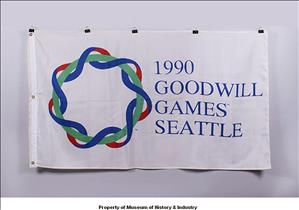On July 20, 1990, Ted Turner's Goodwill Games open in Seattle. Conceived as an apolitical alternative to the Olympics, the games promise international goodwill through world-class competition. Some 2,300 athletes from 54 countries compete in 21 sports in Western Washington, Spokane, and the Tri-Cities. The games and the companion Goodwill Arts Festival, conferences, and friendship activities promise to do for the region what the World's Fair did in 1962.
In 1984, cable television tycoon Robert Edward "Ted" Turner III (b. 1938) decided to sponsor an international sporting event. He was troubled by the political boycotts of the Olympics by the U.S in 1980 and by the U.S.S.R. in 1984. Turner wanted something that would bring the peoples of the world together. The first Goodwill Games was held in Moscow in 1986. Turner lost $26 million backing the venture, but was undeterred about pursuing another.
Even before the Moscow games, sports promoter Bob Walsh created the Seattle Organizing Committee to bring the games to Seattle. On June 19, 1986, the Committee won the bid from Turner for the 1990 games and Walsh began putting together a $180 million production. Corporations were solicited for sponsorships and governments were asked to cooperate and to provide resources.
Rather than participating nations selecting their best athletes, competitors were chosen by their respective sports federations. This insured that the best athletes in each sport would appear. The principal venue was at the University of Washington in Husky Stadium and the Edmonson Pavilion. The King County Aquatics Center was constructed in Federal Way. Seattle residents were recruited to host Soviet visitors in their homes.
The games began on July 20, 1990, and the opening ceremony took place on July 21 in Husky Stadium. Former President Ronald Reagan (1911-2004) spoke and President George Bush sent a video. The organizers neglected, however, to invite Seattle Mayor Norm Rice (Walsh publicly apologized later).
As an athletic competition, the 17-day games were established as a world-class event. A number of records were set and there were no untoward incidents. Husky Stadium got a new track. The Edmonson Pavilion got a new floor. Federal Way got a new aquatics center. The Space Needle got a 600-pound faux gold medallion for a while.
Financially, the Goodwill Games were a bust. Of the 3,500 athletes expected, 2,300 appeared. The competitions did not draw the spectators that were promised. Turner personally lost $44 million. The vendor who provided event services to the Seattle Organizing Committee walked off the job on day five because the firm wasn't paid and had to sue the Committee for what it was owed. The City of Seattle had to accept $141,000 in unsold tickets as payment for fire protection and emergency medical services. The throngs of tourists did not appear. Hotels had vacant rooms and restaurant business was down by 30 percent or more.
The Goodwill Arts Festival was a success. Beginning July 2, 1990, and running through August 5, a $16.4 million cornucopia of visual and performing arts drew visitors. The Seattle Opera staged War and Peace at a cost of $2 million.

